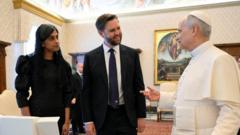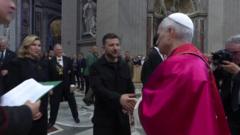As the papal conclave approaches, oddsmakers are taking bets on likely successors to Pope Francis, with Cardinal Pietro Parolin emerging as the frontrunner despite health rumors.
Betting on the Papacy: Odds and Insights Ahead of the Conclave

Betting on the Papacy: Odds and Insights Ahead of the Conclave
In a historic moment, online betting markets target the Vatican's papal election process for the first time.
As the countdown to the papal conclave begins, the landscape of betting is buzzing with excitement as online prediction markets venture into uncharted territory—forecasting the election of the next pope. Traditionally, wagering on papal elections has been a time-honored practice, with records tracing back to 1503. However, this conclave, commencing Wednesday, marks a significant innovation as major betting platforms like Polymarket and Kalshi turn their gazes towards the Vatican's enigmatic selection mechanism.
Currently, Cardinal Pietro Parolin from Italy stands as the leading candidate, according to the current odds posted by these online sportsbooks. Despite recent unverified claims regarding the 70-year-old cardinal's health that the Vatican has refuted, his position remains strong. Other potential papal contenders include Cardinal Luis Antonio Tagle of the Philippines and Cardinal Matteo Zuppi of Italy, both of whom are gaining traction in various betting circles.
Experts speculate that while prediction markets successfully predicted outcomes in political elections, forecasting who will ascend to St. Peter's throne presents a more formidable challenge. According to Franca Giansoldati, a prominent Vatican correspondent, the complexities and secrecy integral to the conclave process create hurdles that betting technology struggles to navigate. Unlike public political contests where voter behaviors can be analyzed through polling and debates, the secretive nature of the conclave (involving approximately 133 cardinal electors) means fewer clues for bettors.
Historically, the results of papal elections have unfolded in unexpected ways. Cardinal Angelo Scola was widely considered the probable successor in 2013 until Jorge Mario Bergoglio, now Pope Francis, was unexpectedly chosen. This unpredictability is a recurring theme; current cardinals reportedly remain divided with many encountering each other for the first time, complicating the potential for alliance-building.
Stefano Maria Paci, another Vatican analyst, remarked that moments behind closed doors can dramatically shift the outcome of the election. The latest betting figures show considerable confidence from online wagerers, with wagers exceeding $27 million as of Wednesday afternoon, rivaling the Super Bowl's betting pools.
As the conclave nears, the economic implications of such wagering are hard to ignore, with analysts eager to see how this novel merging of tradition and technology unfolds in the sacred halls of the Vatican.




















